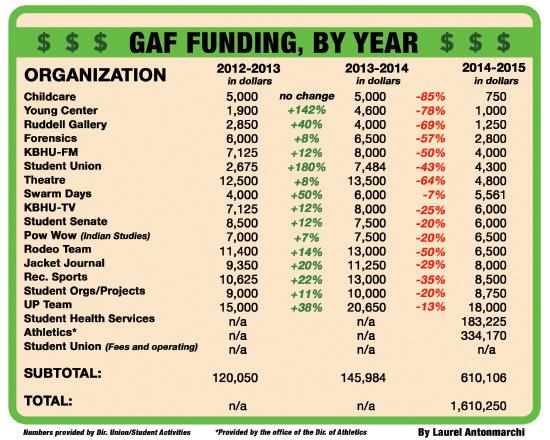GAF Cuts Affect Academic Programs
Budget cuts necessitated by loss in revenue to the General Activity Fee have led to extensive trimming of many student programs this yeara��up to 85 percent in some cases.
The cuts were largely the result of significant loss in revenue due to online course registrations’down about a million dollars this year, according to Jane Klug, director of student union and activities. When students take a class online or at the University Center in Rapid City, even if it is a BHSU course, the General Activity Fee is not collected.
For typical campus classes, students pay $30.50 per credit hour to GAF, $3.49 of which is immediately directed to Student Health Services. Two bond payments for Student Union renovations and the union’s operating budget are also subtracted before funds are allotted to student programs.
Credit hours contributing to GAF totaled 52,500 last year, amounting to a little over $1.6 million in revenue for the 2014-15 school year. A committee of students and administrators are in charge of setting GAF allocations. The South Dakota Board of Regents requires students to have the majority of votes on funding, the university president having the final say.
Between the two bond payments, the union’s operating budget, and Student Health Services’ budget, nearly three-fourths of the GAF fund is spent before any other program funding is considered. Athletics typically receives the bulk of the remaining amounta��$334,170 this year. The resta��about $92,000a��was divided among student organizations and a few academic programs. The University Programming (UP) Team received $18,000 of that remainder, a little over double that of any other program. The UP Team is responsible for planning campus-wide events and entertainment.
“They’re the ones who kind of influence the culture on campus the most with those programs and keep students here, and they proved themselves the year before, so we thought it was viable to keep them there, ” said Chase Vogel, Student Senate president.
Meanwhile, a few academic programs have been forced to limit their programs due to the cuts they received this year.
Theatre and forensics both saw significant decreases in funding. Theatre took the biggest cut of programs tied to academia’down 64 percent from last year. The loss has affected classwork for theatre students. Funds are not available to produce the bigger shows in Woodburn, causing lab components to be removed from curriculum.
“I didn’t want the students to not have the experience of doing four shows, so we just basically cut out all the scenery, cut out all the costumes,” said Bert Juhrend, professor of theatre. “I’m trying to keep it as normal as I possibly can this year.”
GAF budgeting decisions were made last spring with the assumption that assistance would come from academics to supplement the program. As of yet, nothing has been committed.
This year’s GAF allocations were voted on by a panel of five students and four administration members. Vogel and Dr. Lois Flagstad, vice president of student life, presented the decision to Dr. Kay Schallenkamp last spring for her approval.
Since the cuts were not distributed evenly across programs, funding decisions were based primarily on who has contributed most to student engagement and retention. Swarm Days funding took the smallest cut- with a 7 percent decrease. UP Team also retained most of their funding’down 13 percent from last year. “They’re really needing the activities and the programs in order to keep students here. If they don’t have anything to do, they will leave,” explained Klug.
That will likely be the case for the theatre program if funding is not increased. Without larger productions, the theatre major will be in jeopardy.
“At BH it’s great. We’re small enough that you can learn everything. In the big theatre schools…you’re not going to get to learn as many facets, because there are so many people. Here you learn to be a specialist, and we’ve had many graduates go on to get jobs in real theatre because of their vast knowledge from the program here,” explained theatre student Melissa Barnard.
Without these productions, the necessary skills can’t be taught.
“If you’re going to offer a degree in something, the teachers need to be able to effectively teach it,” said Barnard. “When you come in and pay your tuition, you expect it to go to what you are learning.”
Academic funding from sources other than GAF is being considered for the theatre program, if not campus media and forensics. As of yet, nothing has been decided.


